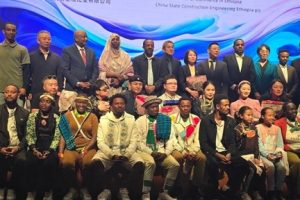
Despite the indispensable role the social media has played in bringing the existing broad-based reform, it has brought unbearable conflicts and instigation among the public by disseminating ill interest messages including fake news and hate speech,communication experts calling for measure to reduce its burden.
Prime Minister Dr. Abiy Ahmed recently made an appeal to both the general users and the online opinion leaders to exercise ethical and professional integrity while using the platform and refrain from instigating conflicts among people with different ethnic, religious and ideological backgrounds. Speaking to The Ethiopian Herald, Journalism and Communication Assistant Professor at Addis Ababa University Dr. Mulatu Alemayehu says that the social media has been playing iconic role in mobilizing the public to the realization of the reform by availing them frequent information.
Dr. Mulatu indicates that the platform is also instrumental in networking the public for common goals and disseminating timely information on the reform whilst providing frequent updates and giving the opportunity to the society to make genuine reflections on government’s activities and plans. The expert states that the social media platforms including Facebook have been beneficial in paving the way for the interactions among different sections of the society and diverse interest groups thereby positively influencing the political narration of the country.
Sharing the above, Journalism and Communication Lecturer at Mekele University Kibrom Berhane says that bloggers and social media opinion leaders have been utilized the platform for productive purposes and they promoted ideas in settled manner thereby positively influencing the decision of policy makers.
According to him, the social media is served as a means to the government to know public’s diverse interests capitalized on the advantage it has enjoyed against the traditional media in accessing a huge number of people at a time.
The expert further indicates that the affordability and openness of social media for anyone with the access to Internet and communication gadgets significantly increases the role of the platform in communicating social, political, and cultural issues and nurturing the culture of public discourse.
Despite the aforementioned benefits, the social media has been largely abused by some opinion leaders and bloggers for personal and collective gains. In this regard, Kibrom argues that the public’s perception towards Ethiopia’s political context appears to be substantially shaped by the unrefined and subjectively framed messages from the social media than by the relatively ‘objective’ messages mediated through the traditional media.
This kind of political communication also engendered continuing ethnic and political controversies in the country. “Posts that appeal to emotion and consists sensitive contents tend to get huge public interaction,” he said, adding that some opinion leaders and bloggers deliberately post controversial issues to build personality cult.
Many writers in the social media also entertain populist views to get public’s attention and manipulate public’s opinion by injecting personal bias. The expert says that individuals and intertest groups who could not express dissatisfaction in the mainstream media abuse the online platform to present personal discontent as discrimination targeting against certain ethnic, religious and political group.
By the same token, Dr. Mulatu stated that the frequent and biased reports of a certain ethnic, religious and political group on the social media have huge implication on the public to become more sensitive and individualistic for such issues. The instigation and fake news have also huge contribution for the current politically-charged atmosphere in the country.
He points that some opinion leaders and bloggers are engaged in manipulating public opinion through disseminating fake news and selfinterested information so that creating fear and intimidation on some targeted groups. Some political blocks are also use social media to disseminate defamation against contesting groups to weaken their capacity and ensure the supremacy of their ideology among the public.
Concerning Premier Abiy’s appeal, both experts say that the call showcased the government’s consideration to the issues that have been entertained in the social media and its demand for the campaigns should be undertaken in ethical and responsible manner. The appeal would also bring in significant outcome in encouraging electronic media actors refrain from incitement.
The academics, however, express fear that the appeal could give a sign for some social media opinion leaders in that the government is being influenced by the noise in the Facebook and it may encourage them to continue in their disruptive activities. Kibrom states that online practice and ethics should be incorporated in the new education curriculum and stakeholders should nurture the personal and moral integrity of students and the youth for the productive use of social media.
Actors in the electronic media have also huge responsibility to consider the moral, ethical and societal values while acting in the platform. Dr. Mulatu highlights that building the public’s media literacy is something the government should give utmost priority to enhance the user’s ability to evaluate and cross check the messages they obtain from different social media outlets to exclude fake news.
Enhancing the institutional capability of conventional media outlets in providing a timely and accurate information is also worth equal consideration to reduce fake news. The experts say that putting in place a law and ethical codes that could play the traditional media’s gatekeeping role in active social media users is crucial in regulating the practice.
Both the general users and the online opinion leaders should become responsible for their actions so that the country capitalizes on the opportunities the online media avails to the consolidation of the reform, they remark.
The Ethiopian Herald, March 26/2019
BY BILAL DERSO





